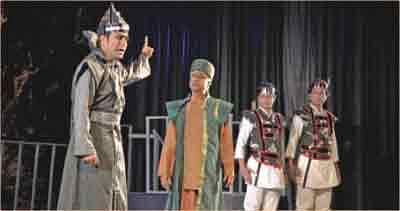Tagore's play about building dam on a waterfall has deeper meaning for Indians and Bangladeshis

“Muktodhara” is directed by Naila Azad.
Written in 1922 by Noble laureate Rabindranath Tagore, the play “Muktodhara” sweeps away the differences between the people of Shibtarai and Uttarkut. Similarly, Bangladeshi troupe Theatre's production “Muktodhara”, directed by Naila Azad, brought the people of Bangladesh and India closer.
As part of the yearlong celebration initiated jointly by the governments of Bangladesh and India, from May 2011, on occasion of the 150th birth anniversary of Rabindranath Tagore, the 31-member troupe is visiting India with its production. Their first performance was staged on April 4 on the Rangamancha of Eastern Zonal Cultural Centre Complex, Salt Lake, Kolkata.
The one-an-half hour performance by Theatre has successfully won the heart of the Kolkata audience. Ratna Bhowmick, a regular theatregoer living in Salt Lake, appreciated the team work, as was evident especially in the performance of the citizens of Shibtarai. Veteran thespian Ferdousi Majumdar once again proved her eminence, donning the role of Bibhuti, the architect of the dam that tries to hold the flow of the waterfall Muktodhara. Tropa Majumdar's acting, in the role of Amba, the woman who lost her son, was also heart rendering.
The play itself refers to the current political and economical strife among nations over natural resources. The ugly truth regarding the present day environmental politics appears in the antagonist Ranajeet's dialogue, “It is easy to pressurise from the top. Keeping the foreign subjects under that pressure is politics.” Yet at the end of the play, spiritually wins, as Bairagi says, “One can sit on the throne after becoming the king, but one cannot become the king just by sitting on the throne.”
Renowned personalities including eminent litterateur Shirshendu Mukhopadhyay; theatre activist Manoj Mitra; Acting Deputy High Commissioner of the People's Republic of Bangladesh, Tareq Md Ariful Islam, were present at the programme. Kishore Krishna Banerjee, director of Raja Rammohun Roy Library Foundation and member secretary of Eastern Zonal Tagore Commemoration Committee, presented a brief of the yearlong programme in the welcome address. Last year, Indian artistes visited Bangladesh. Art camps, recital workshops, theatre workshops were held in Bangladesh and India. This year Bangladeshi theatre and dance troupes will be visiting Kolkata, Delhi, Agartala, Shilong and Silchar as part of the cultural exchange, he said.
In his speech, chief guest Shirshendu Mukhopadhyay highlighted the relevance of Tagore's philosophy in today's world. Ramendra Majumdar, president of International Theatre Institute, and team leader of the 31-member troupe visiting India, said, “In Bangladesh, we have not only inherited Tagore but achieved him after a long struggle. In 1961, we celebrated Tagore's birth centennial in an adverse atmosphere; today we are celebrating his 150th birth anniversary in a much favourable situation.” He hoped that the people-to-people relationship that developed as a result of the joint celebration would also make the relationship between the governments of the two countries cordial.
His words were echoed in the speech of the Acting Deputy High Commissioner Tareq Md Ariful Islam. He said that the intensity of the relationship that has developed between the two nations through the cultural exchange should continue and create more scope for research on Tagore. Lastly, Manoj Mitra praised the members of Theatre for their relentless effort and good performance. At the end of the programme, Anup Motilal, director of Eastern Zonal Cultural Centre presented the vote of thanks. Theatre's next show will be held at the Kamani Auditorium in New Delhi on April 7.

 For all latest news, follow The Daily Star's Google News channel.
For all latest news, follow The Daily Star's Google News channel. 



Comments